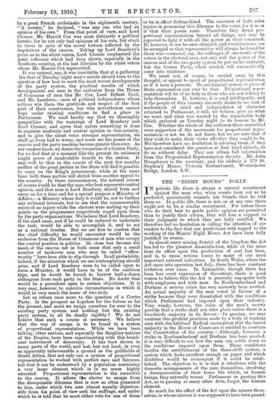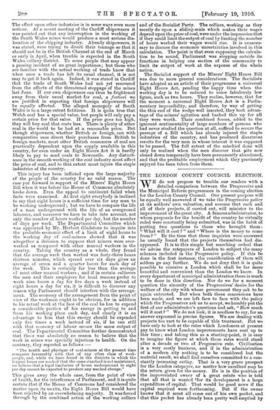THE " EIGHT HOURS " FOLLY.
IN private life there is always a natural resentment against the man who, when events turn out as he predicted, persistently reminds his friends that he told them so. In public life there is not., or at any rate there ought not to be, a similar resentment. For unless those who do their best to guide public opinion are permitted thus to justify their advice, they will lose a support to their judgment to which they are fully entitled. We therefore feel no hesitation in calling the attention of our readers to the fact that our predictions with regard to the working of the Miners' Eight Hours Act have been fully justified by events. In almost every mining district of the kingdom the Act has led to the greatest dissatisfaction, while at the same time its effect upon the production of coal has been, and is, to cause serious losses to many of our most important national industries. In South Wales, where the Act came into operation last July, there has been constant irritation ever since. In Lancashire, though there has been less overt expression of discontent, there is good reason to believe that the Act is generally unpopular both with employers and with men. In Northumberland and Durham a serious crisis has very narrowly been averted. An actual majority of the men voted in favour of a strike because they were dissatisfied with the conditions which Parliament had imposed upon their industry. Very wisely, however, the rules of the men's society provide that a strike shall not take place unless there is a two-thirds majority in its favour.—In passing, we may contrast this prudent provision made by a body of working men with the habitual Radical assumption that the barest majority in the House of Commons is entitled to overturn the Constitution of the country.—Although, however, a strike in Northumberland and Durham has been averted, it is very difficult to see how the men can settle down to the conditions imposed upon them. These conditions involve the establishment of the three-shift system, a system which looks excellent enough on paper, and which doubtless would be economical if it could be estab- lished. The objection to it is that it interferes with the domestic arrangements of the men themselves, involving a disorganisation of their home life which, as human beings, they naturally resent. Parliament in passing this Act, as in passing so many other Acts, forgot the human element.
So much for the effect of the Act upon the miners them- selves, in whose interest it was supposed to have been passed. The effect upon other industries is in some ways even more serious. At a recent meeting of the Cardiff shipowners it was pointed out that any interruption in the working of the South Wales mines would produce a most serious dis- location of the shipping industry. Already shipowners, it was stated, were trying to divert their tonnage so that it should not be in the British Channel at the end of March or early in April, when trouble is expected in the South Wales colliery -district. To some people that may appear a passing incident of no great importance • but those who are familiar with the actual working of trade know that when once a trade has left its usual channel, it is not easy to get it back again. Indeed; it was stated in Cardiff that the trade of South Wales had not yet recovered from the effects of the threatened stoppage of the mines last June. If our own shipowners can thus be frightened away from their usual market for coal, a fortiori we are justified in expecting that foreign shipowners will be equally affected. The alleged monopoly of South Wales is to a large extent fictitious. It is quite true that Welsh coal has a special value, but people will only pay a certain price for that value. If the price goes too high, they will buy coal that costs less. There is plenty of other coal in the world to be had at a reasonable price. But though shipowners, whether British or foreign, can with comparative ease divert their purchases from British to foreign markets, most other British consumers of coal are practically dependent upon the supply available in this country, for even under an Eight Hours Act it is hardly likely to pay to send coals to Newcastle. Any disturb- ance in the smooth working of the coal industry must affect the price of coal, and to that extent must injure the staple industries of the country.
This injury has been inflicted upon the large majority of the people of the country for no valid reason. The case put forward in support of the Miners' Rig'ht Hours Bill when it was before the House of Commons absolutely broke down. Even the appeal to sentiment failed when facts were examined. At first sight everybody is inclined to say that eight hours is a sufficient time for any man to be working underground ; but we have to compare the life of a man underground with the life of an overground labourer, and moreover we have to take into account, not only the number of hours worked per clay, but the number of days per week. The Departmental Committee which was appointed by Mr. Herbert Gladstone to inquire into the probable economic effect of a limit of eight hours to the working day of coal-miners showed that it was altogether a delusion to suppose that miners were over- worked as compared with other manual workers in the country. Taking the country as a whole, they found that the average week then worked was forty-three hours thirteen minutes, which spread over six days gives an average of seven and a quarter hours for each day of the week. This is certainly far less than the average cf most other manual workers ; and if in certain collieries the men and their employers for local reasons prefer to work nine hours a. day for five days a week instead of eight hours a day for six, it is difficult to discover any reason why Parliament should interfere with the arrange- ment. The economy of the arrangement from the point of view of the workman ought to be obvious, for in addition to his actual work at the face of the coal he has to expend a considerable portico of his energy in getting to and from his working place each day, and clearly it is an advantage to him that this energy should be expended only five times a week instead of six, if he can still with that economy of labour secure the same output of coal. The Departmental Committee further demonstrated that there was absolutely no reason to believe that the work in mines was specially injurious to health. On the contrary, they reported as follows :- " The health and physique of coal-miners at the present time compares favourably with that of any other class of work- people, and, while we have found in the districts in which the hugest hours are worked that the same standard is not maintained, we believe that a legal limitation of hours underground to eight per day cannot be expected to produce any marked change."
This gives away the whole case, from the point of -view of health, for the interference of Parliament, and it is quite certain that if the House of Commons bad considered the matter upon its merits, the Eight Hours Bill would have been rejected by an overwhelming majority. It was forced through by the combined action of the working colliers and of the Socialist Party. The colliers; working as they mostly do upon a sliding-scale which makes their wages depend upon the price of coal, were under the impression that if they could limit the output of coal by limiting the number of hours worked their wages would rise. It is urneces- sary to discuss the economic uncertainties involved in this calculation. The point is that even supposing the calcula- tion to be sound, Parliament was stepping outside its functions in helping one section of the community to limit its output of work at the expense of the whole nation.
The Socialist support of the Miners' Eight Hours Bill was due to more ge,neral considerations. The Socialists have adopted as an article of their programme a universal Eight Hours Act, pending the happy time when the working day is to be reduced to some fabulously low figure, such as two hours. They realise, however, that for the moment a universal Eight Hours Act is a Parlia- mentary impossibility, and therefore, by way of getting the thin end of the wedge well inserted, they took advan- tage of the miners' agitation and backed this up for all they were worth. Their combined forces, added to the ignorant sentimentality of large numbers of persons who had never studied the question at all, sufficed to secure the passage of a Bill which has already injured the staple industries- of the country, and has produced disastrous results for the very men in whose interest it was supposed to be passed. The full extent of the mischief done will only be realised when the men discover that pits now closed down temporarily have been permanently abandoned, and that the profitable employment which they previously enjoyed has been taken from them.









































 Previous page
Previous page